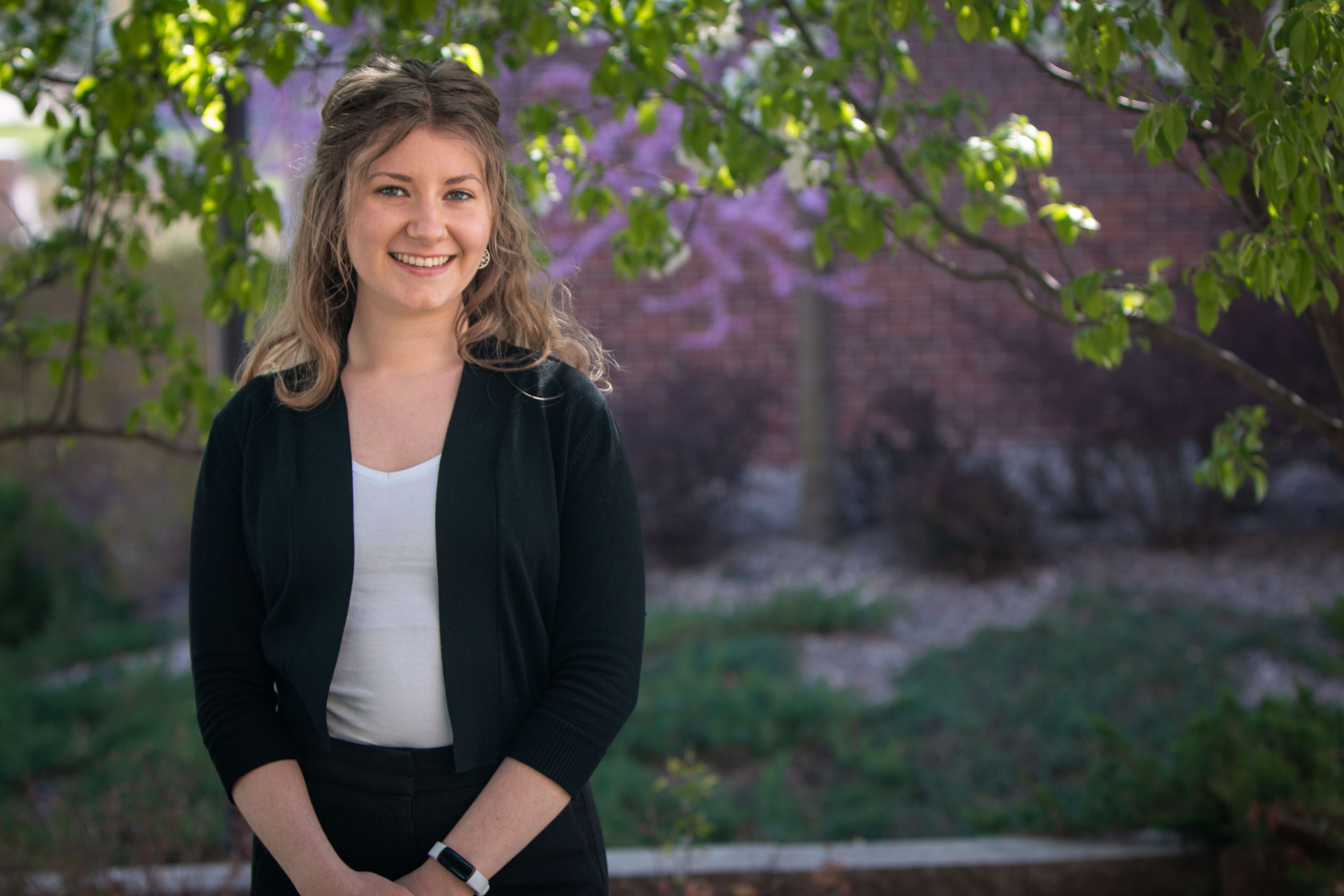For Christina Delray, a graduate student and instructor of record in the University of Nebraska at Omaha’s (UNO) Department of English, learning has never been confined to a classroom.
Born and raised in Omaha, Delray received her primary and secondary education through homeschooling before enrolling at Metropolitan Community College, where she completed an associate degree in Liberal Arts Transfer Studies. Degree in hand, she transferred to UNO as an undergraduate to pursue a Bachelor of Multidisciplinary Studies, with a concentration in English and a double minor in Psychology and Studio Art. Along the way, she noted, she also explored journalism and creative writing courses—stepping stones on a winding path.
Now an alumna of the undergraduate program, Delray is currently enrolled in UNO’s Master of Arts in English program, pursuing the Literature and Culture Graduate Certificate and the TESOL Certificate alongside her degree.
“My interest in English, particularly literature, has developed my entire life,” she said. “As a child, I struggled to learn to read and spell. I credit my mother for my love of literature and language, because she was the one who helped me overcome my self-doubt and learn how to read.”
One day, she said, while reading a book in Mary Pope Osborne’s Magic Tree House series, she was struck by a bolt from the blue. “I had a breakthrough moment,” she said, “and have never stopped reading since!”
The bolt became a fire. The graduate student developed a broad and expansive appreciation for the written word, pouring over works from a broad range of authors and poets—Keats, Dickens, Tolkien, Harold Keith, Ellen Raskin, Colson Whitehead and Brandon Sanderson, to name a few.
“Literature is such an engaging way to study the human condition,” she said, “to confront moral and ethical questions, understand the spectrum of human emotion and develop empathy and critical thinking. What we do in the English department can be a counterweight to our highly pragmatic culture. The humanities remind our culture of what it means to be human—which is a deeply emotional experience.”
What originally drew the graduate student to UNO, she said frankly, was affordability.
“I grew up poor, so I took the frugal route to college,” she explained. “I did not expect to fall in love with UNO, but I did. “I think our campus is beautiful, and the diversity of thought here is always so exciting—especially in discussion-based classes.”
She credits Critical Approaches to Literature—a class she took with Dr. Lisabeth Buchelt while a junior in the undergraduate program—as a major turning point in her academic journey.
“That class opened my eyes to the academic world of literary criticism,” she said.
“I think this field can easily be misunderstood and labeled as unimportant, but the study of humanity is crucial. When emotion and logic are divorced from one another, or when one is valued over the other, we can become both stupid and heartless.”
Over the years, Delray has worn many hats at the university. As a graduate student, she is taking a diverse set of coursework while teaching composition classes as a Teaching Assistant (TA’s in the English department, she explained, are “actually the instructors of record, not assistants”) and working in the UNO Writing Center.
She will be the Graduate Assistant for the Writing Center next academic year, as well as the Graduate Representative for the English department.
“I flourish when I’m doing a lot of different things,” she said. “That’s why getting a Bachelor of Multidisciplinary Studies was the perfect match for me.”
While she has loved her experience at UNO overall, Delray noted that the 2024-2025 academic year has been particularly “amazing”—a whirlwind of successes and growth. Her essay “Adaptive and Maladaptive Applications of Religious Thought in Parable of the Sower” was submitted for publication in Callaloo, a prestigious journal published by Johns Hopkins University. On behalf of the Octavia E. Butler Literary Society, she presented the same essay at the Research and Creative Activity Fair and at the American Literature Association Conference in Boston.
While teaching two sections of Composition one over two semesters, working at the writing center and writing and presenting research, Delray has maintained a 4.0 grade-point average.
“Every experience has pushed me to grow, whether that’s preparing for conferences or standing in front of a classroom,” she said. “It’s been challenging, but deeply rewarding.”
Delray plans to present another paper at the European Studies conference at UNO in October, and hopefully at a few other conferences throughout the year.
Although time between all her activities at the university is “pretty short,” the graduate student still tries to carve out time for her myriad “passion projects,” including painting, drawing and writing.
“I have...been working on a novel for the past few years,” Delray noted, “which I will hopefully complete soon!”
Firs among her influences as an academic and teacher, said Delray, is her mother—her “first educator” and “a huge supporter.” But she also has had many mentors and role models within the university system, including Dr. Buchelt, Dr. Kay Siebler and Melanie Seitzer.
“From Buchelt, I learned that being yourself is your greatest asset in a classroom; authenticity goes a long way with students,” she said. “And Siebler and Seitzer have been great mentors during my first year of teaching, giving me advice on how to design my classroom policies.”
As Delray continues her education, she said she hopes to “keep exploring new subjects, maybe Spanish, theater, or art history. “I see education as a lifelong journey,” she concluded.
